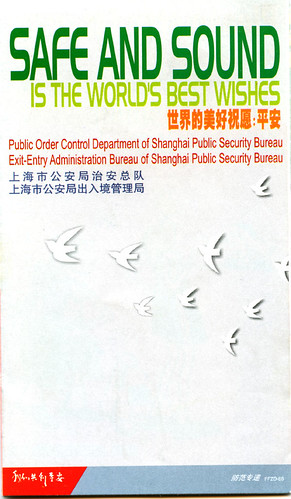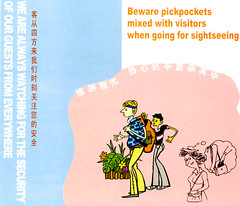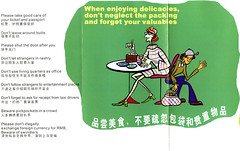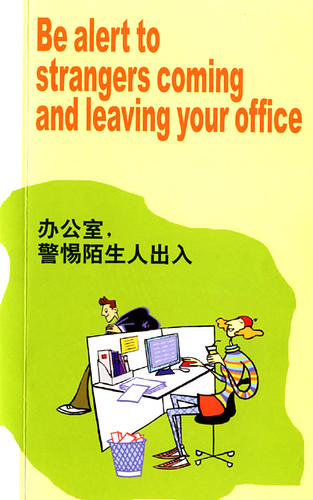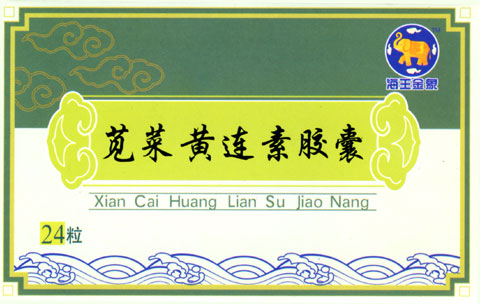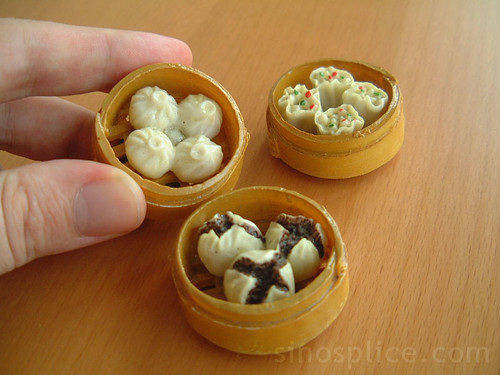19
Sep 2005Transnational Life
From Ape Rifle:
> I guess that is one of the biggest downfalls of the transnational life: you meet amazing people, only to let them go as we all drift back to our respective countries or chosen corners of the world. This will be my fourth consecutive year of goodbyes, and I think that emotionally I’m getting rather tired of it. Could it be time to settle down somewhere for real? Do I need to stop being such a goddamned drifter, and realize that I can’t keeping hopping around the globe leading a disposable life without suffering the consequences once the glory of youth starts to fade?
I really identify with Patrick’s feelings.
17
Sep 2005Baidu Sued
It was bound to happen. Baidu wants to be a major player and catch the world’s eye. It had its initial public offering (IPO) just last month. But when you play with the big kids, you have to play by their rules. And the big kids care about intellectual property rights. So now the world’s biggest music companies are suing Baidu.
Could this be the beginning of the end for Baidu MP3 Search?
Update: this is part one of a possible chain of events which has already been predicted. The end result? Google buys Baidu. Chinawhite also has some thoughts on this. We’ll see what happens…
Related: Using Baidu MP3 Search
Thanks to Eden for bringing the story to my attention.
16
Sep 2005Safe and Sound in Shanghai
Exciting news! The Public Control Department of Shanghai Public Security Bureau has teamed up with the Exit-Entry Administration Bureau of Shanghai Public Security Bureau to produce yet another free, attractive, and informative propaganda pamphlet entitled SAFE AND SOUND IS THE WORLD’S BEST WISHES!
Please don’t think this is an entry devoted to making fun of Chinglish. That joke is a little tired by now, and I think it’s sort of mean-spirited sometimes. Rather, I would like to share with everyone what I learned from this educational pamphlet. Here we go!
- Pickpockets mix with visitors! Even when going sightseeing! Those crafty devils. Therefore beware.
- Your car is not a safe. So you know all those sacks you have marked with dollar signs and stuffed full of cash? Don’t keep them in your car. They could get stolen. You should carry them around with you.
- Apparently my foreigner habit of relaxing at night with a wineglass of XO whiskey in front of my flatscreen TV, my back to the open door, is not safe. Good to know!
- My habit of gravitating toward stealing and snatching could actually result in me getting my own things stolen! I should in fact stay far away from stealing and snatching.
- The theft situation in Shanghai is so bad that luggage actually steals other luggage!
- Here in Shanghai we don’t just “eat.” Oh, no… We enjoy delicacies, you country bumpkin! (Meanwhile our things are getting stolen.)
- You know that guy that comes into the office with a big black sack and rummages through our stuff? Be suspicious of him!
The production of this pamphlet was truly a kindness on the part of the Shanghai Public Security Bureau. There are some things we foreigners just don’t understand.
15
Sep 2005Stylish Antidiarrheal
OK, maybe this is really weird, but I really like the design of this medicine box. It just so happens to be antidiarrheal capsules of the traditional Chinese medicine variety.
If you guys are really good, I’ll even give you an update and let you know how well they work!
Update: They work great!
Related: More diarrhea on Sinosplice!
14
Sep 2005The Other "Black Music"
I recently stumbled across African Hip Hop Radio. I’m certainly no authority on hip hop, but while I find the African hip hop interesting, I wouldn’t call it good. (Yet.)
It makes me wonder, though… how much of the interest generated in the African hip hop scene (both in Africa and around the world) is based on the racist assumption that if blacks in America (or elsewhere) can do it, so can blacks in Africa? Such an assumption denies successful black hip hop artists the credit they deserve and simply feeds into a “black people have rhythm” stereotype. It also ignores the role of the United States and other countries in creating a cultural atmosphere conducive to the production of such music.
Personally, I would be much more interested in African music that was completely devoid of some (imagined) cultural/ethnic/racist link. African country music, African punk, African emo… now that would get my attention. I would also expect the African interpretations of those genres of music more innovation and adaption of those music forms.
On the other hand, African musicians may just be seeing this as an “easy in.” Because it’s hip hop and the rest of the world has some interest in hip hop, they have hope of recognition. The racist idea that blackness functions as some kind of validating factor for the quality of the hip hop music produced works to the African musicians’ advantage.
Take the Chinese example, though. The rest of the world, in general, has little interest in traditional Chinese music. Chinese immigrants have not developed entirely new genres of music in other countries. Most modern Chinese music is often viewed as derivative of Western pop, Western rock, Western rap, etc. The few Chinese musicians that dare to be innovative receive scant attention overseas. The Chinese musicians have a difficult task ahead of them because they have no “easy in.”
I make these observations off the top of my head; my views are not researched. I’m interested in other opinions on this. Whatever the case, though, I am very interested in musical innovation coming from Africa, China, and anywhere. Even if I consider the music uninteresting, I respect the artists’ courage to innovate.
13
Sep 2005Comment Submit Issues
I’ve been getting reports of difficulty submitting comments. I’ve been having them too, and in the WordPress interface as well. The commenting difficulties go something like this:
– IE users get a “page cannot be found” error after clicking “submit comment.”
– Firefox users get absolutely nothing after clicking “submit comment.” It looks like it’s working, like a new page is loading, and then it just dies.
I’m not sure what’s causing this. It’s not a China issue, because it’s happening to people outside of China as well. That means it’s either a hosting issue or a WordPress issue. I’m guessing it’s the latter, probably caused by a plugin. I’ll try to fix it soon, but I don’t have a lot of free time on my hands.
In the meantime, you can still submit comments. IE users, hit back and submit again. Repeat as necessary. Firefox users, just click and wait for it to go through. Repeat as necessary.
Sorry for the inconvenience, and thank you for your patience.
12
Sep 2005最后一次!
Alaric点了我,叫我回答以下几个问题:
【常常听或是有特別回忆的五首歌曲】(太多了!我随便说几首我很喜欢的歌…)
1. Denison Witmer – California Brown and Blue
2. Ben Folds – Jesusland
3. The Killers – Mr. Brightside
4. Broken Social Scene – Cause=Time
5. The Cribs – The Wrong Way to Be
【五部最近看过的电影】(DVD也算吧?我很少去电影院。)
1. Donnie Darko
2. CSI 第4季 (算不算?)
3. …???
不记得了!最近太忙了,没怎么看电影。
【五件最近令自己愉快的事情】
– 有很好的奖学金我可以申请!
– 找到了很不错的一份工作,也不会影响我的课
– 最近跟一些中国朋友打了麻将,我打得还可以!
– 女朋友请我吃冰淇淋
– 很可爱的孩子的微笑
【五件最近令自己郁闷的事】
– 卡特里娜飓风
– 布什总统
– 伊拉克战争
– 看到人在路上随地扔垃圾
– 发现了这个学期好像会很忙很忙的…
【书籍篇】
1. 持有之书籍数量:真的不知道!在美国还有很多,在中国也有…
2. 正在读的书:Prelude to Foundation (Isaac Asimov)
3. 最后所买的书:语言学课本
4. 特別的五本书籍:Hard-boiled Wonderland and the End of the World (村上春树), 1984年 (George Orwell), Illusions: The Adventures of a Reluctant Messiah (Richard Bach), The Stranger (Albert Camus), Remembering the Kanji (James W. Heisig)
这回我点:
– Kastner(报复!)
我再也不做这样的游戏!你们不要点我了!!!
12
Sep 2005Taxis and Rain
Yesterday as I rode in a taxi through Xujiahui I was glad that I was not one of the many people trying in vain to hail a cab. It can be extremely hard to find a taxi when it rains. Sometimes it’s completely impossible.
A thought struck me, so I asked the driver:
> Me: Master*, do you like rainy days better or non-rainy days better? On rainy days you get more business, right?
> Driver: With traffic like this, the rain doesn’t do that much for business. I can only get a few fares anyway, with all the traffic I have to sit in.
> Me: Well what about rainy days when the traffic isn’t bad?
> Driver: The traffic’s bad even when it doesn’t rain. When it rains it’s even worse.
> Me: Well what about late at night when it rains?
> Driver: Yeah, I guess business is a little better than usual then.
> * In China, drivers (and many other blue collar workers) are addressed as shifu, which is the same way students address their kung fu masters. I always get a little kick out of calling a taxi driver or a plumber a word that can be translated as “master.”
The typhoon is upon us here in Shanghai. What an auspicious sign for my first week of classes. This week I don’t actually have my first class until Thursday, though.
10
Sep 2005怪癖
(这是Kastner让我做的!一般我不喜欢这样的游戏,但为了练练中文这次可以接受。)
游戏题目:《怪癖》
发一篇日志写下自己的5个怪癖(奇怪的嗜好、异于常人的习惯)。
游戏规则:
1. 首先注明被谁点到名。
2. 写下自己的5个怪癖。
3. 把题目传给另外5个人(不能点已被指定之人)并通知他们。
4. 被点的另外5个人继续做相同的事。
我的5个怪癖:
1. 每天起来以后要过三个小时左右才会觉得饿,所以很少吃早饭。
2. 我能把舌头折起来(这样)。
3. 我能动耳朵。
4. 我能让眼睛发抖。
5. 我会抛球杂技(juggle)。
开始点名:Todd,Alaric,stickyrice(快把blog修好啊!),riverrich,witheredleaf。
09
Sep 2005Tiny Chinese Food
Check out my new refrigerator magnets!
Here are some pictures of actual Chinese food that the magnets resemble:
I got the magnets from a vendor set up right outside the Pizza Hut next to Zhongshan Park. He told me they were 2 RMB each. I knew full well they weren’t worth that, but sometimes you really don’t feel like haggling over a couple RMB. I offered him 5 RMB for all three, which he accepted immediately.
08
Sep 2005New Ireland
When I ride in taxis, the drivers frequently ask me if I’m American. I confirm it, of course. I guess I look very American. The “casual look” and all. When I met Todd here in Shanghai recently, his comment was that I was “even more American than [he] expected.”
Well, I yam what I yam.
The other day I had an audition for a commercial, and I was told to come somewhat dressed up. So I did. The cab driver asked me if I was British.
After learning I was American, he asked me if “New Ireland” was a city or a state. I asked him to repeat the name. Then I realized I had misunderstood. I was having my first Chinese conversation about the tragedy that is New Orleans (新奥尔良). It sure sounded a lot like “New Ireland” the first time I heard it.
Neither of us had much insight to offer.
07
Sep 2005Reliable Web Hosting in China
Anyone who lives in China and maintains a website knows that it can be difficult. Websites are frequently blocked and unblocked for no discernible reason. Maintaining your website from China may become extremely difficult (if not impossible) if it is blocked in China. With this in mind, choosing a hosting service for your website can be tricky.
This article assumes you are looking for professional hosting which offers ample online disk space, reasonable bandwidth limits, MySQL databases, e-mail accounts, etc. MySQL databases (or some form of database) are necessary to run advanced blogging software like WordPress or Movable Type.
06
Sep 2005Chinese Hooters Psychology
Shanghai’s Hooters restaurant is very old news by now. “A symbol of a new China,” blah blah blah. The Western media ate it up.
Shanghaiist recently did an interview of a Shanghai Hooters girl named “Quasar” and got to ask some of the more important questions:
– How does the salary for a waitress at Hooters [Shanghai] compare to waitresses at other [Shanghai] restaurants?
– Do you know what the word “hooters” means? [Note: the Chinese translation of the restaurant chain’s name is 猫头鹰, which simply means “owl” and has no sexual connotations.]
– In America, there used to be some controversy about Hooters. Feminists didn’t like it because they thought it treated women poorly, treated them just as sex objects. I guess you don’t think that’s the way it is in China?
– How did you choose [your English name]?
See the interview for the answers to these incisive questions.
05
Sep 2005Chengyu for Superpowers
A reader of mine is working on her thesis, and she needs help. She’s looking for chengyu or other Chinese quotes to add some flavor. She needs your help ASAP! Leave your suggestions in the comments.
The thesis is basically about where China stands in relation to superpower status. So the first half of the thesis involves discovering what exactly a superpower is, and how the concept of superpower changes in relation to contemporary world order. And the second part is applying the conclusions of the first part to China and seeing how it fares. I’ve divided it into 5 chapters, plus an introduction and a conclusion, so to be able to use chengyu or other phrases/quotes I need to have one for each. This is the breakdown of chapters:
1. Introduction. In this section I point out that a lot of what is written about China these days as a rising superpower is vague, inaccurate or in some cases alarmist. I explain my basic justification for the thesis, which is to see where China stands in relation to what a superpower is. So I’d like to put something at the start that would suggest that things are not always what they seem, something about the problem of exaggeration etc.
2. What is a superpower? In this chapter I present the development of world power from the inception of the term superpower in 1944 up to the present day, and use this to chart how the concept of superpower has changed. Then I discuss a few theories about the current world order, and on the basis of that decide what forms of power a state must possess in order to be a superpower. These are grouped into military power, economic power, political power, and domestic cohesion, which is the basis for the next four chapters. The only things I can think to use at the start of this chapter are 水落石出 or 画龙点睛. Of these the first is probably better, but I’m sure there’s others out there about power or strength, and the importance of power.
3. Military power. I assess the military development and capabilities of China, including also its natural sources of power: population, natural resources, geography. I thought Mao Zedong’s quote that 抢杆子面出政权 would be good here, but any suggestions are welcome. I read an English translation of a quote by Sun Tzu from the Art of War about how the acme of skill is not to win 100 battles, the acme of skill is to defeat the enemy 100 times without fighting. I’ve tried to find it in Chinese, but the Chinese version I found (on zhongwen.com) didn’t seem to have the
same connotations.
4. Economic power. I look at the growth of the Chinese economy, and how that gives them international power. There’s also a bit about the importance of indigenous technology, and a sound industrial base, as well as something on the impact of multi-national corporations. I found a quote by Deng Xiaoping encouraging people to push ahead with market socialism: 无论黑猫白猫,抓到老鼠就是好猫. But again, any suggestions of chengyu about money, the power of money etc are very welcome.
5. Political power. This is discussion of China’s political role at an international level, including its overwhelmingly realist approach to international relations, its involvement in regional groupings such as the Shanghai Cooperation Organisation and ASEAN, its leading role in the 6-party talks about North Korea etc. A major point of this chapter is that a superpower is only a superpower if it is recognised and treated as such by the rest of the world. And I have no ideas in relation to a
suitable chengyu about the power of politics.
6. Domestic Cohesion. In this chapter I argue that states cannot project power on an international level if they are not stable at a domestic level. So I look at China, especially with reference to the income divide that is building between the wealthier coastal provinces and the inland provinces, the common occurrences of civil disturbances/protests in recent years, and the problem of uniting a nation when market socialism goes against the tenets of communism. These are contrasted with rising nationalist sentiment as a way of uniting the state, and the attempts by the leadership to slow growth in the eastern and southern provinces while fostering growth inland, so as to counteract the growing inequality. I’m sure there are lots of phrases in the general style of an apple looking lovely on the outside but not necessarily on the inside, or some such sentiment. The only one I know is 驴粪蛋表面光 – although I like it a lot, it’s probably a bit cheeky!
7. Conclusion. A general summing up, my basic conclusion being that although China has or is developing great military power, is an increasingly central economy in the world, and is more and more being treated as a political power, it probably does not yet have these types of power to an adequate extent to merit it being labelled a superpower. And its main challenge in coming years will be to maintain domestic stability. I suppose 画龙点睛 would probably do here, although something to do more with looking at everything as a whole would probably be better.
04
Sep 2005Greg's Departure
For the first time in two years, Greg is no longer a teacher at ZUCC in Hangzhou. His plane left Shanghai today at 12:45pm.
Greg plans to come back to China. In the meantime, he will be missed.
P.S. Greg may not be living in China anymore, but he still has lots to say about his experiences here. So don’t forget to check Sinobling from time to time.
02
Sep 2005My Textbook on Dialects
As I understand it, the universtity, in conjunction with the Party, assigns approved textbooks to all courses. Students must buy these books. Then, when it comes to actually teaching the course, the professors choose how much those official textbook choices are used and how much other materials the professors personally select are used. The book I was so busy studying for a while, Modern Chinese (现代汉语, 上海教育出版社), is one of the ones chosen by the Party. That can make for interesting reading sometimes.
Here’s my slapdash translation of a paragraph on dialects in China (pp. 8-9):
> In order to adapt to the needs of socialist construction and promote the function of language in society, we must actively support the common language of China’s ethnic groups — we must rapidly popularize Mandarin Chinese. “Mandarin serves the people as a whole, whereas dialects serve only the people of a particular region. The spread of Mandarin does not mean the deliberate extinction of [other] dialects. Rather, it entails a gradual reduction in scope of the [other] dialects’ usage, in keeping with the objective requirements for the advancement of society. [Other] dialects can — and inevitably will — coexist with Mandarin in the long run. However, Mandarin’s scope of usage must be continually expanded, and Mandarin must be used as much as possible for public occasions and written materials. We must correct the narrow-minded views of those who do not accept Mandarin, are not willing to listen to Mandarin, or do not even allow their children to speak Mandarin. We must correct published materials — literature in particular — in which the misuse of [other] dialects appears.” We should correctly recognize the relevance of dialects as a form of communication within an ethnic minority while consciously promoting the development of the common language, reducing the influence of [other] dialects, and not only actively using Mandarin oneself, but also doing one’s best to spread the use of Mandarin.
The quote within the passage comes from a 1955 article in the People’s Daily entitled “For the Advancement of Language Reform, Promote Mandarin and Strive for the Standardization of the Chinese Language.”
So basically, the government doesn’t want to squash the other dialects, it just wants to reduce their role to insignificance while Mandarin dominates all. Apparently that doesn’t count as squashing them.
I have the feeling that the typical Shanghainese person would just laugh at a passage like this. Every now and then I hear that Shanghainese is in danger, but it seems pretty healthy to me.
One interesting issue raised by translating this passage had to do with the Chinese words 普通话 (Mandarin) and 方言 (dialect). In normal Chinese usage, Mandarin is pretty much never referred to as a dialect, even though by linguistic definition it could fairly be called a “standard dialect.” Yes, dialects can be standard or nonstandard, but they’re still dialects — variations of a larger linguistic group (of course, whether or not the different dialects/topolects of Chinese are actually separate languages altogether is a whole different can of worms). Yet in this passage, “dialects” were continually referred to, and the implication was “not Mandarin” and “inferior.” This linguistic bullying may not seem very strange, but keep in mind that the above passage came from a university’s core linguistics text! Ah, but it’s a Party-approved book… not so surprising after all.
Related: “Dialects” in China
01
Sep 2005Mafia Mania
When writing about Supergirl I mentioned that some of my girlfriend’s friends came over to my place recently for a party. It wasn’t much of a party, really… more just friends getting together to snack, chat, play cards, and play mah jongg. Very Chinese-style recreation. (This was mostly the same group as the one I played Eat Poop You Cat with.)
I really don’t like the card game that they always play, so I just kind of hung out and watched. And even though my girlfriend taught my whole family how to play mah jongg over the summer, I kind of forgot, and was a little embarrassed to play with people that really knew how. Yeah, a pretty sad attitude for someone who’s lived in China as long as I have, but what can I say? I just didn’t feel like playing those games.
For dinner we ordered pizza and Chinese food. After dinner things got more interesting. Someone suggested we all play Mafia.
I was happy about that, because I knew mafia is a good game. I figured we could all have a good time with it. What I never imagined was how long we would all end up playing it.
We started at about 8pm with 9 people. There were two mafia every round. A few people had never played before (my girlfriend included), so it took a little while to get going. The guardian angels were especially bad at first, but when the guardian angels started doing a better job, everyone else started relying heavily on them to deduce who the mafia were. Some people got really serious about the game. Some rounds took 30 minutes or more (with only 9 people total!). There was no alcohol involved at all.
I had a good time, but by about 3am I was pretty tired and ready to quit. Yet no one was leaving! So I had to be a good host and keep playing. The game didn’t end until 5am. 5am! These were not college students… they were all young professionals in their mid- to late twenties or older. I never expected them to stay so late.
Like I said, I had a good time (it’s a great game), but I never imagined I would ever play 9 straight hours of Mafia. Damn.
31
Aug 2005我没有死!
我已经有很长时间没写中文blog了,但不是因为不想写。虽然换blog软件的过程相当顺利,但是留言功能出问题了。我一直想处理这个问题,但找不到问题的来源。今天终于修好了所以我可以恢复写这个blog。
我9月5日去华师大注册,应该是9月12日开始上课。
最后我给大家看一个笑话。这是”samueldl”跟我分享的。
> 男人最让女人感动的一句粗话
> 赵先生一早起来就头痛的要死…… 因为他前一天晚上喝的烂醉回家! 他强迫自己把疲惫不堪的眼睛睁开。睁开眼后竟然看到床头上放了一杯水跟几颗头痛药,然后坐起身后又看到了他的衣服已经烫好、叠好在床边。因为一起床就看到这几样反常的事,所以他决定要起身看一看房子其它的地方有没有什么奇怪的事他把几颗头痛药吃了。 吃的时候突然发现药下有一张纸条,纸条上写着……
> “亲爱的,我出去买菜了,你的早餐我已经做好放在餐桌上~ 趁热吃吧~爱你喔~”
> 赵先生一头雾水的走进了厨房,然后就真的看到了热腾腾的早餐在桌上还有当天的早报。
他看着坐在餐桌吃早餐的儿子问……
> “儿子啊~昨天到底发生了什么事?”
> 赵先生的儿子回答:
> “嗯……你凌晨三点跌跌撞撞,大吼大叫的回了家,把几个家俱给打坏踹坏。然后又很聪明的在走廊上撞了墙壁几下,送给自己一个黑眼圈!”
> 赵先生越来越不明白的又问了儿子:
> “那为什么家里给打扫的那么干净然后你妈又给我做了热腾腾的早餐给我吃呢 ?!”
> 儿子恍然大悟的说:
> “喔~ 你是在问那个喔~~ 妈昨天看到你醉死的回家,一肚子火的把你拉到房间里, 然后想把你脏衣服换掉,结果在脱你裤子的时候你骂了她一句 ‘喂~小姐~你滚远一点~我已经结婚了~‘”
31
Aug 2005Chunky Salsa Sinosplice
I got some good feedback on my new layouts, including a request for a Chunky Salsa layout by one Jamie Doom. Greg offered zealous support for this idea. I don’t like to let down friends, so I gave it some serious thought. Jamie then proceeded to create a Chunky Salsa “layout” on his own blog.
Jamie is a man of many talents, but I am sad to say that Chunky Salsa design skillz is just not one of them. I knew, however, that Jamie (and quite possibly Greg as well) had some serious, borderline neurotic needs for online Chunky Salsa, so I had no choice but to go that extra mile and put together my own Chunky Salsa layout.
Get it while it’s fresh… it may not last! In the meantime, for those of you that need it, each new Sinosplice post can be a fresh bowl of China salsa for your minds. But this blog needs chips. You, the readers, can be those chips. Together we will boldly forge into uncharted Salsa-China blog territory!
Update: It works now.

